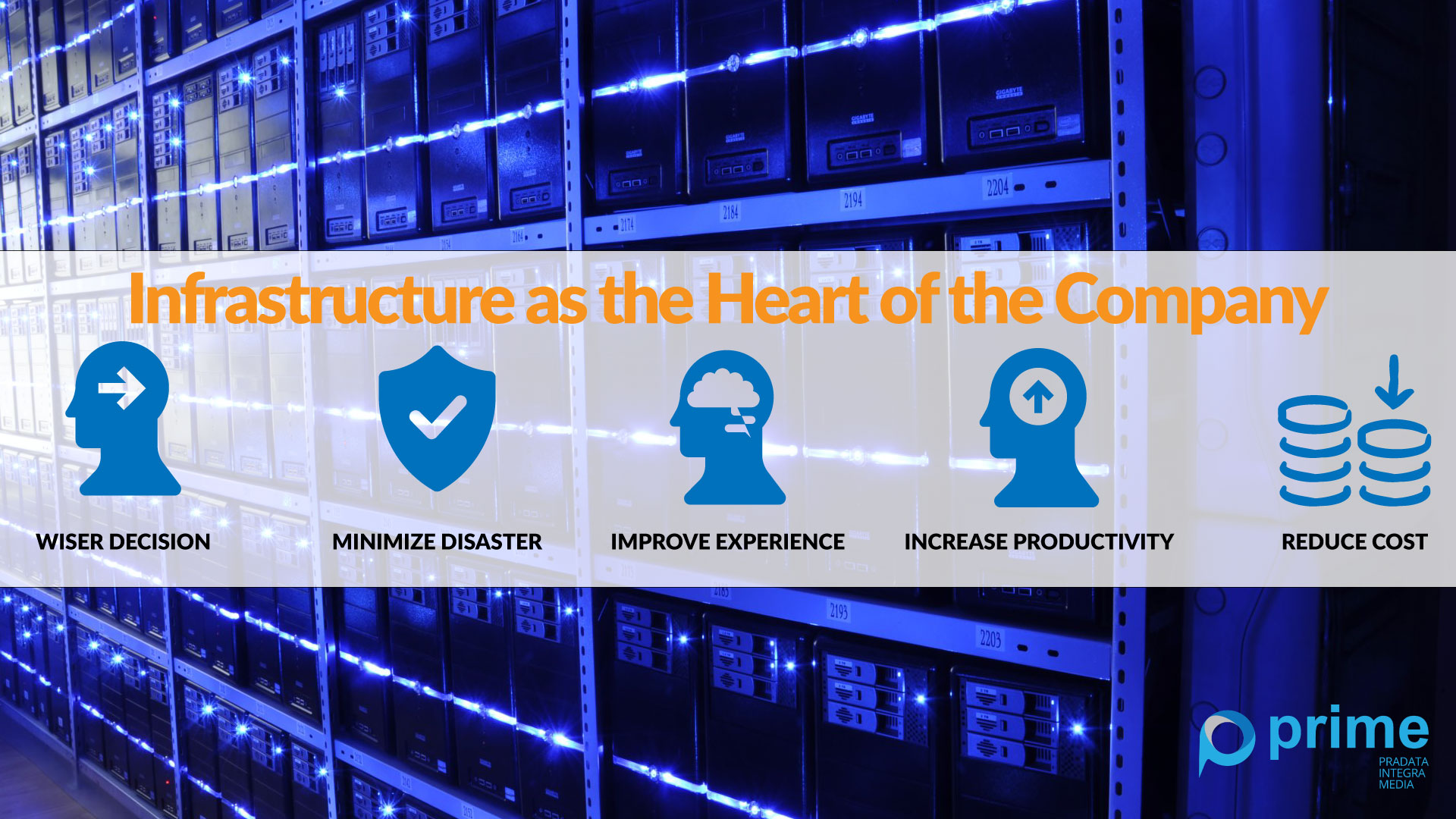 October 12, 2018 4:16 am |
October 12, 2018 4:16 am |
In managing a company, it is important for leaders to pay special attention to the management of IT infrastructure. This is important because in the BIG DATA Era, IT infrastructure plays an important role in the company’s business success story. In order to maintain the operational continuity of a planned and periodic maintenance of IT infrastructure, it must always be carried out. Unfortunately, many companies pay less attention to this. As a result there are many obstacles from simple things to complex server failures. All of that depends on the quality of the IT infrastructure that is owned, the higher the quality possessed by the productivity and efficiency of the company will also be higher. For this reason, the company must wisely allocate a portion of their budget to manage the infrastructure management solutions they have.
Especially in the current digital transformation, the planning and implementation of strategies to improve the efficiency of IT infrastructure can be done by implementing the latest systems and applications in the present. But besides that, a strong and fast infrastructure is needed to support the needs of all of them. (read more : Key Criteria for Building Ideal IT Infrastructure)
But in reality, there are still many companies asking why they need quality IT infrastructure? Many companies misunderstand the true role of IT infrastructure and assume that IT infrastructure is only needed as a supporting tool to carry out their business activities. Even though IT infrastructure can provide more benefits than that.
Many developing companies and small businesses that are not technology-based companies start their business by creating a “DIY” infrastructure that is enough to just do what is needed for their business continuity – they invest in basic hardware such as computers, laptops, simple telephone systems and routers for internet connections. Communicating with employees, suppliers and customers is basically delivered through a cloud application that allows them to share files via the Internet, such as, Dropbox, Evernote and Google Apps for Business.
However along with the company growth, they will face issues with security, connectivity and overall productivity are troubled. Speed and accuracy are very important, but what about system disruptions and security threats? Cyber attacks on small businesses rose 300 percent since 2012 because of weak online security and lack of responsiveness of the company in handling these problems.
Ensuring the IT infrastructure reliability and secureness are not easy thing. To get a significant competitive advantage, strategic infrastructure is very important to implement. Smart investments in hardware, software, network services, and people to manage them can all be the difference between successful and failed companies. Many companies cut corners by saving costs which can result in a decrease in the quality of their devices – even something as simple as poor cable installment can make the software application unusable to cause damage to the device.
To overcome the next generation IT challenges, business leaders need to be involved in meeting infrastructure needs, increasing the importance of IT infrastructure and making the right investment for the future. Here are some points that show that Information Technology Infrastructure Management is important:
1. Make a Wiser Decision
Many companies that pay less attention to their IT facilities include monitoring the condition of their IT facilities. By managing the IT environment, companies can detect when to change or update their system, and detect the emergence of risk early. For that periodic maintenance planning must always be applied in order to maintain the sustainability of IT devices
2. Minimize Disaster
Fixed problems can occur even though the company has made various efforts to prevent disasters from occurring, but by implementing IT infrastructure management correctly and correctly, the company can reduce the occurrence of problems and minimize damage. The selection of the right equipment and the right human resources to manage IT infrastructure is also something that the company should not underestimate.
3. Improve User Experience
By monitoring IT needs at all times, operators can make a better experience for the company. Regular monitoring can prevent sudden downtime, and control it if needed. When downtime is needed, both for maintenance and other purposes, the company will be better prepared to handle the impact of downtime. In addition, by monitoring every IT need, the company can optimize the performance of each device that is used with regular maintenance so that it can be used for a longer time.
4. Keep Productivity Flowing
When there is data that is erased, lost, or damaged, the company can restore it by making the right decision from the perspective of IT infrastructure management. By building backup data on IT infrastructure, the Company will be able to retrieve or restore company data at any time when needed, so that companies can maintain access to the information they need to continue to work without a hitch.
5. Reducing Costs
In their daily operation, companies are often faced with unexpected events, as a result the unexpected costs must be expelled. If companies do not manage IT infrastructure properly and correctly, they will not be able to predict or manage these costs. By being proactive and managing IT infrastructure beforehand, companies can save money by using budgets for their IT infrastructure more wisely.
Tags: efficient IT Infrastructure, importance of IT Infrastructure, IT facilities, IT Infrastructure, IT Infrastructure management








